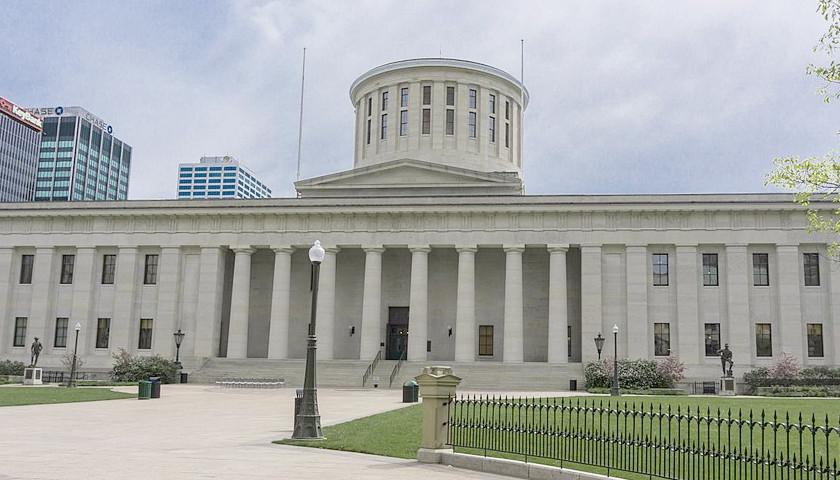The Ohio House introduced its version of the state budget on Tuesday, including a $1 billion tax cut, higher income limits for school vouchers, and a ban on TikTok from government devices.
The second iteration of a plan to spend more than $86 billion over the subsequent two fiscal years is contained in the 5,300-page proposal known as House Bill (HB) 33.
Ohio Governor Mike DeWine did not propose overall income tax cuts in his budget, which he presented to lawmakers in February. Instead, he included special exemptions for groups including families, builders of affordable housing, and first-time home buyers.
The revised budget proposal, however, would increase the threshold at which Ohioans are exempt from paying any income tax from the current $25,000 to their first $26,050 of income.
Additionally, the proposal aims to eliminate a middle-class tax bracket. As a result, Ohioans with lower and middle incomes who earn up to $92,150 per year will pay the same reduced income tax rate of 2.75 percent. According to eFile, currently, Ohio levies income taxes at 2.765 percent on earnings between $25,000 and $44,250 and 3.226 percent on earnings between $44,250 and $88,450.
Though the updated plan somewhat modifies who would be subject to the two top tax rates, they would remain unchanged. Up from $110,650 under current law, income as low as around $115,300 would be subject to the highest income tax rate of 3.99 percent. The second-highest income-tax bracket, which currently applies to income from $88,450 to $110,650, would be applied to income from $92,150 to $115,300 each year, at a rate of 3.688 percent.
The budget would somewhat reduce the minimum amount of tax paid, which would result in a modest reduction in income taxes across the board, even though the top rates would not change.
According to House Finance Committee Chair Jay Edwards (R-Nelsonville), if lawmakers take action to bring down the top tax brackets, that helps the wealthier Ohioans, and the caucus’ wants to prioritize doing more to help the middle-class individuals in the state.
“I think in the times we’ve had right now, in the times that we’re just coming out of a COVID, I think, you know, our focus in this caucus and I think you’ll talk to even some more conservative members, our focus is on middle-class Ohioans trying to do more for middle-class Ohioans,” Edwards said.
DeWine’s budget raised the income thresholds for Ohio’s EdChoice school voucher program from 250 percent to 400 percent of the federal poverty level. For a family of four, that would translate to an annual income of $120,000.
Republicans in the House and Senate have presented legislation that goes further and calls for a universal voucher program open to all Ohio children. However, those suggestions were absent from the House budget. Instead, it advised raising the upper-income level to 450 percent, or $135,000 for a family of four.
The House proposal would maintain the new school funding system lawmakers adopted in the previous two-year budget. Representatives from the state included the $388 million that DeWine requested for school resource officers in the total budget for public education.
The House budget would prohibit using TikTok, WeChat, and other services “owned by an entity located in China” on government devices.
DeWine announced a comparable restriction via executive order in January, citing worries that the Chinese government may use these apps to collect private information about users’ lives or businesses.
However, lawmakers dropped a proposal that DeWine included in his initial budget and that Lt. Governor Jon Husted promoted requiring parental approval for minors using social media.
According to Edwards, he thinks individuals should decide on their own if they want social media parental approval for their children or not.
“The framework that was set forward in the governor’s budget was you had to go to the attorney general, and the attorney general had to choose to take your case up and it was really out of people’s hands. We think people should be able to make those decisions,” Edwards said.
The revised budget also includes raising minimum salaries for teachers, paying for rural highway and bridge projects, removing a ban on distributing flavored tobacco products, moving the start of gun season for deer hunting, and increasing wages for in-home healthcare workers.
Lawmakers expect the full House chamber to approve HB 33 next week. The Ohio Senate will then consider it. A budget approved by both chambers must be reconciled before being sent to DeWine for approval before the fiscal year’s end on June 30th.
– – –
Hannah Poling is a lead reporter at The Ohio Star and The Star News Network. Follow Hannah on Twitter @HannahPoling1. Email tips to [email protected]
Photo “Ohio Statehouse” by Ɱ. CC BY-SA 4.0.





